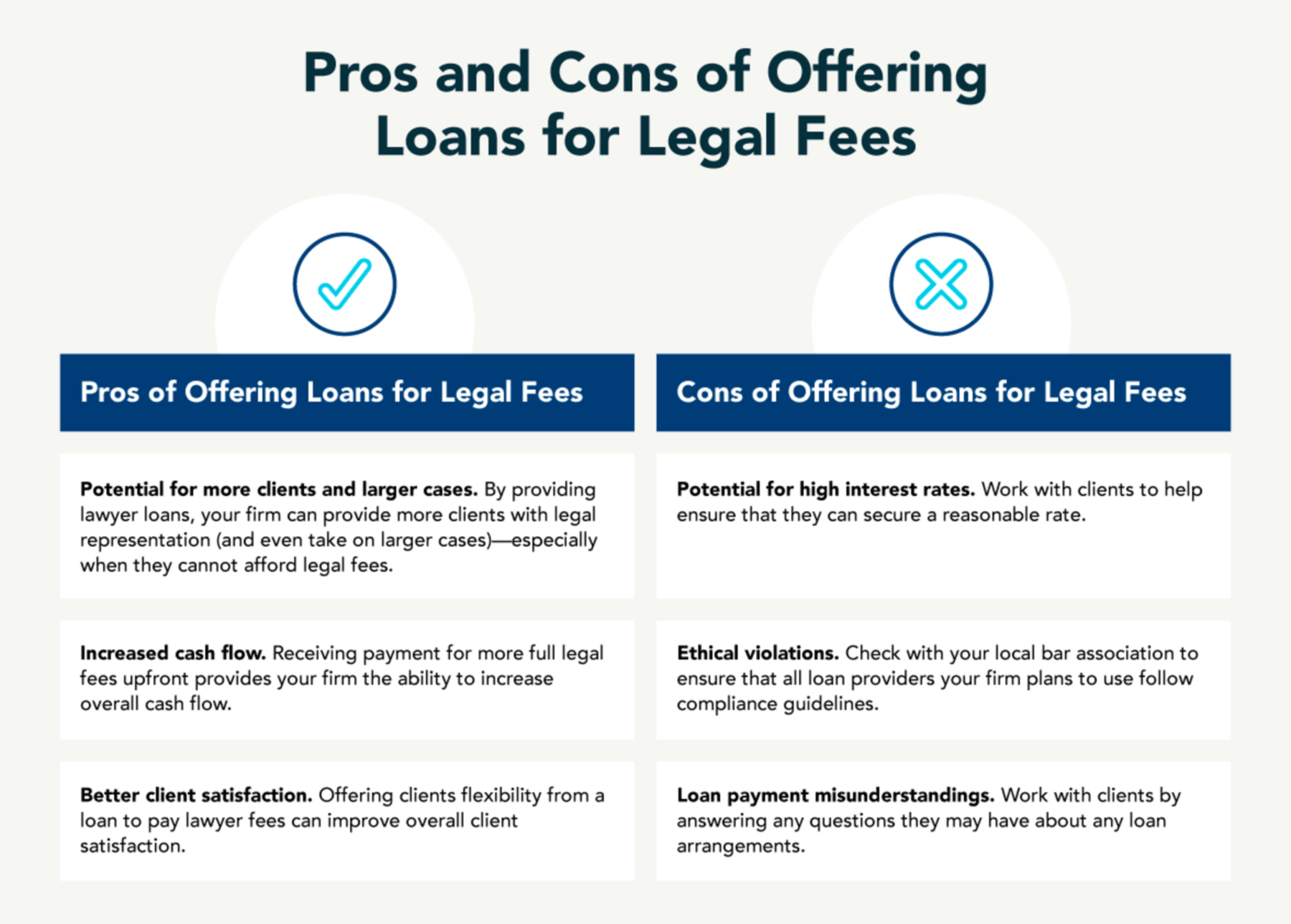An estimated 80 percent of the U.S. population can't afford legal fees, which aligns with current data on savings balances in U.S. households. According to a recent Bankrate report more than half of Americans wouldn’t pay for a sudden $1,000 bill from their savings, with 27% of U.S. adults having no savings at all—the highest percentage since 2020.
U.S. households are low on cash, and it affects their access to legal representation.
However, according to the Bankrate report, many Americans would borrow in the event of an emergency. Legal loans, which are available from both banks and private lenders, are a great solution. With the right setup, your firm can streamline payments and provide cash-strapped households with access to legal help.
In this article, we’ll explain how law firms can ethically facilitate loans for attorney fees, top legal fee loan options, the benefits of offering legal fee loans, the pros and cons of these options, and qualifications to consider before rolling them out.
What Are Loans for Attorney Fees?
Loans for lawyer fees are unsecured, personal debts that the borrower uses to pay for a lawyer. Typically, the loan has a fixed interest rate and fixed monthly payment. The repayment schedule can range from a few months to several years, depending on the loan amount and the borrower's credit qualifications. For law firms, loans to pay lawyer fees allow clients to pay in intervals—which can be a great way to boost cash flow over time.
Why Is It Important to Offer Loan Options for Your Legal Fees?
The cost of the legal process, especially if a case goes into litigation, can be very expensive. If your firm does not offer loans for legal fees, you are limiting your available client base. Even if your firm is in an affluent area with primary service toward wealthy individuals, it's unlikely that every prospective client has enough cash or credit to cover their legal expenses.
If your firm does not offer loans for legal fees, you are limiting your available client base.
As a result, would-be clients will either forgo representation or find a law firm that is more accommodating. You don't want to lose a client to a competitor, simply because the other firm has a loan program, and your firm doesn't.
Pros of Offering Legal Fee Loans
Under the right circumstances, offering loans for legal fees, especially through an in-house financing program, can deliver significant benefits to your firm. These benefits include access to a wider client base, improved cash flow, and a richer customer experience.
These benefits include access to a wider client base, improved cash flow, and a richer customer experience.
Access a Wider Client Base
An in-house loan offering can increase the number of clients who can realistically retain your firm. During their initial consultation, prospective clients can be informed about your firm's financing option, which can prevent them from declining services due to cost. This is an especially good way to potentially poach clients away from competitors that do not offer a lawyer loan option.
Improve Cash Flow
Providing an in-house loan for legal fees offering can increase your firm’s overall revenue stream. For instance, many legal fee financing options provide your firm with cash upfront while clients pay in installments. With this type of legal loan option, you can begin representation immediately (and fully paid), rather than waiting for clients to pay their bills over time.
The good news is that, with this option, your firm faces no repercussions if the client doesn't repay the loan as scheduled. Repayment issues are handled privately between the lender and the client. The lender cannot legally ask your firm to repay any of the client's borrowed funds.
Delight Clients with an Easy Payment Option
Your firm's financing program may be necessary for cash-strapped clients, but it's also a convenience for any client. For example, you may have current clients who want to borrow money to pay their lawyer (even if they don’t necessarily need to) or prospects who are delaying the legal process until they have the necessary funds on hand. A new, fixed-rate loan is an option that clients would appreciate, as it is less disruptive to household finances than, say, liquidating investments or charging retainer fees to a credit card.
Furthermore, with legal loan programs available through companies like Amazon, Macys, Target, and Walmart, clients expect similar options to pay for services including legal fees. Since a legal loan is similar to these types of point-of-sale installment loans that certain retailers offer, clients will value the ability to pay their invoices more easily.
Cons of Offering Loans for Legal Fees
Before offering a loan option for legal fee payments, consider a few of the obstacles below so your firm can be proactive in addressing each.
Potential for high interest rates
A high loan interest rate may increase the overall cost of legal services. Before commencing a loan, work with clients to help ensure that they can secure a reasonable rate.
Ethical violations
Avoid ethical violations by checking with your local bar association to ensure that all loan providers your firm uses or plans to use, as well as client loan arrangements, follow compliance guidelines.
Loan payment misunderstandings
If clients choose to use a personal loan for legal fees, the terms and conditions may be complex and lead to misunderstandings. Work with clients by answering any questions they may have about any loan arrangements.

Qualifications to Consider Before Offering Loans for Attorney Fees
Before exploring how your firm might roll out a loan program, consider whether the initiative is appropriate for your client base.
Ideally, your typical client would meet or exceed the lender's standards for creditworthiness. If most of your clients don't qualify for credit, your firm's loan offering could be counterproductive. Denied loan applications don't serve your firm or the individuals who need legal help.
Primary loan considerations include a client's credit score, loan amount, debt-to-income ratio, and proof of income and employment.
Before exploring how your firm might roll out a loan program, consider whether the initiative is appropriate for your client base.
Credit Score
A person’s credit score is a numeric measure of their ability to manage debt. People who make late payments or use a high percentage of their available credit tend to have low credit scores. Those who routinely pay their bills on time and manage their debt accounts conservatively have higher credit scores.
There are three major credit bureaus that report credit histories and calculate credit scores. Lenders, including legal lenders, rely heavily on this data to make loan underwriting decisions. Typically, loan applicants with credit scores below 670 have trouble getting loans approved. When these applicants do receive loan approvals, the loans carry higher-than-average interest rates.
You may not know the typical credit score of your client base. You do, however, have experience billing your clients. From that experience, you may be able to generalize their financial health.
Loan Amount
The loan amount is a primary factor in the borrower's ability to repay the debt. The payment on a $5,000 loan will be far less than the payment on a $15,000 loan, assuming both have the same interest rate and repayment schedule. For this reason, lenders are more likely to accept lower income and lower credit scores on smaller loans vs. larger ones.
You know the range of fees your firm collects from clients. That data can help you decide how useful a loan offering will be for your firm. Ideally, your typical client can qualify for a loan that funds your average revenue-per-client.
If your clients generally have low credit qualifications, then an installment program may be more suitable for your firm.
Debt-to-income ratio
A debt-to-income (DTI) ratio is another factor that lenders take into consideration before approving a loan. This metric is calculated by dividing the total monthly debts a candidate owes (such as a car loan, mortgage, and student loan) by gross monthly income. The lower the DTI, the higher the likelihood that monthly payments will be made on a new loan.
If your firm's clients generally have a lower DTI, 1.5 or less, then they are prime candidates to qualify for a loan.
Proof of Income and Employment
Providing proof of current employment/income also shows lenders that a candidate is capable of repaying a loan. For some lenders, this is a required qualification before approving of a loan. Proof of income and employment is provided in the form of a W-2 form, pay stubs, a signed letter from the employer, and/or tax returns and bank deposit information (if the candidate is self-employed).
Top Legal Fee Loan Options
Your firm cannot ethically loan money directly to your clients. You can, however, partner with a loan provider. This type of partnership can provide clients with the flexibility to pay in installments, while your firm gets full payment upfront. But what are a few of the best legal fee loan providers in the market? According to various sources such as Bankrate, Lightstream, Upstart, SoFi, Best Egg, and Upgrade, are among the best loan providers that offer reasonable interest rates and repayment terms, fast funding, and low credit score requirements. They are also generally rated highly among businesses and borrowers.
However, they are not built specifically for attorneys' needs. With LawPay’s Pay Later legal fee lending solution, built into LawPay's payment software, you can easily provide a loan to clients while your firm receives the full invoiced amount from the lender. This option not only helps in boosting cash flow but can also allow your firm to take on more business. According to our 2024 Legal Industry Report which surveyed over 2,600 legal professionals, 47% of firms are able to accept more cases by offering Pay Later. This legal fee funding option also offers distinct advantages in the areas of legal compliance, integration, and direct delivery of funds.
With LawPay’s Pay Later solution, you can easily provide a loan to clients while your firm receives the full invoiced amount from the lender.
How to Offer Legal Fee Loans at Your Law Firm
If your firm is looking into partnering with a loan provider, there are a few areas to consider to remain compliant and maximize the benefits of loan offerings.
Ensure Compliance
Your loan program must follow American Bar Association (ABA) and Interest on Lawyers' Trust Accounts (IOLTA) guidelines, without exception. This shields you from inadvertent ethics violations that can result from charges against trust accounts.
LawPay is a recognized leader in payment management for the legal industry. Our software, including Pay Later, is fully compliant with ABA and IOLTA guidelines. That’s why over 110,000 legal professionals trust LawPay to process client payments securely and ethically.
Payments that use Pay Later can be directed into trust accounts or operating accounts. LawPay will never debit fees from trust accounts.
Choose a Lawyer Loan Program with Integration
Your loan program should integrate into your billing software and workflow. Without integration, the loan offering increases the workload for your staff and makes it harder for clients to pay you.
For example, when clients select LawPay’s Pay Later option to pay their invoice, the loan application process is initiated. The application collects some personal information, and the client receives a real-time decision on the loan. The entire process takes only a few minutes.
Pay Later supports loans from $150 to $25,000 to individual clients only. Business clients are not eligible for loans through Pay Later.
Confirm that Lawyer Loans Provide Direct Delivery of Funds
You cannot rely on a loan program that requires your clients to collect money from the lender and then pass it along to your firm. This would likely result in lost funds, plus more time spent on bill collection.
Lawyer loan programs like Pay Later deliver the borrowed funds directly to your firm via Automated Clearing House (ACH) after the loan is approved. Settlement of funds usually takes three to five days following loan approval.
The payment is recorded and credited to the client, just as a credit card or eCheck payment would be. Since LawPay integrates with dozens of accounting and legal software programs, the entire process should be seamless, for your clients and your office staff.
Alternatives to Legal Fee Loans
In addition to offering personal loans for legal fees, your firm should also offer additional online payment options—should the client not qualify for a direct loan.
Credit Card Payments
Credit card payments (especially online) are an excellent alternative that allows clients to pay their invoices in full—and without any follow-up responsibilities from your firm. Modern billing and payment solutions, like LawPay, make the process easy with the ability to add credit card payment links directly into invoices. Once the invoice is emailed, clients can simply click the link and pay their bill.
Payment Scheduling
Another legal loan alternative is the ability to arrange payment plans in advance. According to the 2024 Legal Industry Report, 56% of law firms provide payment plans for clients with 48% collecting more money over the course of a case. Software solutions that offer scheduled payments provide your firm with the ability to set up a client’s online payment of choice, choose the charge amount, and select the payment frequency. Solutions like LawPay also allow your firm to easily check payment statuses as active or complete from a user-friendly dashboard.
LawPay Makes it Easy to Offer Loans for Legal Fees
Individuals who cannot afford legal fees upfront will either delay their legal help or find a way to borrow funds. You can streamline this process for them with an in-house loan option. Some clients may initiate a loan to pay lawyer fees out of necessity, while others will borrow for convenience. Either way, your firm receives payment upfront and can begin representation immediately.
Schedule a demo today to see how LawPay’s Pay Later legal fee funding, as well as how its suite of online payment options can facilitate faster payments and improved cash flow for your firm as well as better customer experiences for your clients.
About the author

Adrian Aguilera
